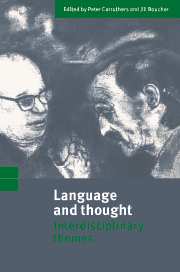Book contents
- Frontmatter
- Contents
- List of contributors
- Preface
- 1 Introduction: opening up options
- Part I Language, development and evolution
- Introduction to part I
- 2 Thought before language: the expression of motion events prior to the impact of a conventional language model
- 3 The prerequisites for language acquisition: evidence from cases of anomalous language development
- 4 Some thoughts about the evolution of LADS, with special reference to TOM and SAM
- 5 Thinking in language? Evolution and a modularist possibility
- Part II Language, reasoning and concepts
- Part III Language and conscious reasoning
- References
- Author index
- Subject index
4 - Some thoughts about the evolution of LADS, with special reference to TOM and SAM
Published online by Cambridge University Press: 08 January 2010
- Frontmatter
- Contents
- List of contributors
- Preface
- 1 Introduction: opening up options
- Part I Language, development and evolution
- Introduction to part I
- 2 Thought before language: the expression of motion events prior to the impact of a conventional language model
- 3 The prerequisites for language acquisition: evidence from cases of anomalous language development
- 4 Some thoughts about the evolution of LADS, with special reference to TOM and SAM
- 5 Thinking in language? Evolution and a modularist possibility
- Part II Language, reasoning and concepts
- Part III Language and conscious reasoning
- References
- Author index
- Subject index
Summary
Introduction
The relationship between language and thought is a classical problem of psychology and philosophy. Can we learn anything about it from a comparative perspective? Is there such a thing as a language-and-thought issue in non-human animals? A first problem for such a comparative approach is that, although most scientists would accept that there is some degree of continuity between our closest evolutionary relatives – non-human primates – and ourselves in terms of our intellectual abilities, this is hardly considered to be the case with linguistic abilities. Although we can identify something like rudimentary ‘thought’ or ‘intelligence’ in non-human animals, it seems that there is nothing worth the name of language in them.
Our sympathy towards intellectual continuity is due, in my view, to the convincing nature of classical findings like those of Köhler (1927) and Goodall (1968), showing that one of our most cherished expressions of intelligence – tool use and problem solving – is present in both captive and wild chimpanzees. Of course there can be controversy about the extent to which there are qualitative differences between ape and human intelligence. But, even assuming that considerable differences exist, there is a relatively non-problematic acceptance of continuity in relation to the origins of thought. After all, continuity does not imply identity.
This is clearly not the case with one of the all-time favourite enigmas of science: the origins of language. An influential view in recent decades has been that language is such a radically new evolutionary product that, in contrast to intelligence, no traces of it can be found in non-human primates.
- Type
- Chapter
- Information
- Language and ThoughtInterdisciplinary Themes, pp. 76 - 93Publisher: Cambridge University PressPrint publication year: 1998
- 4
- Cited by



